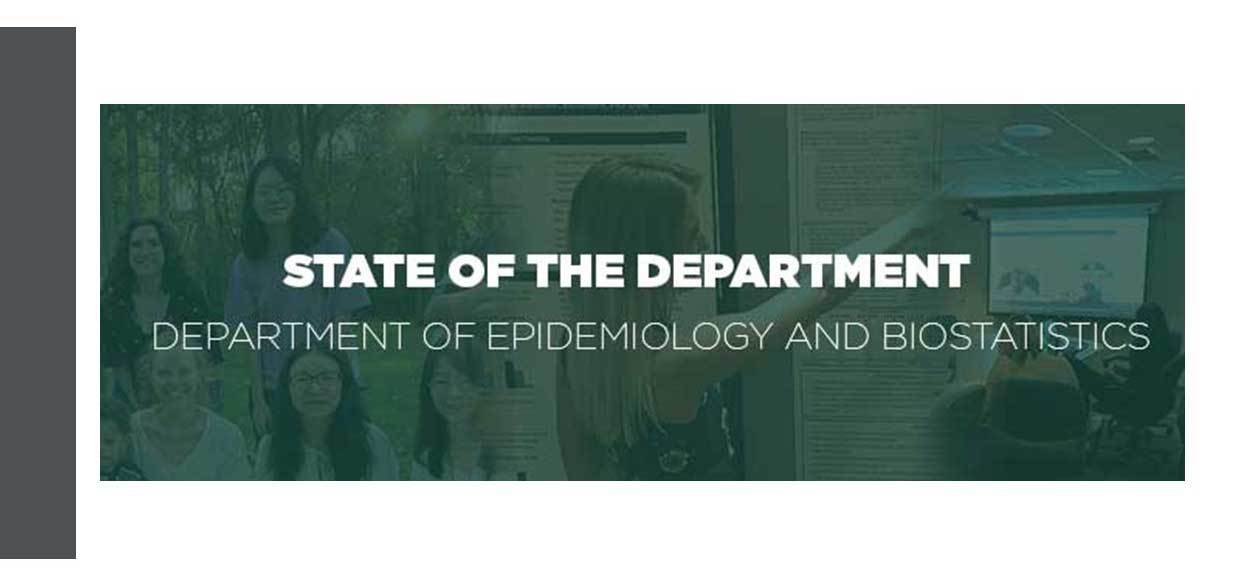2024

Hiring/Recruitment/Retirements
- Dr. Evan Reynolds hired April 2024 (biostatistics)
- Dr. Candice Johnson hired Aug 2024 (epidemiology)
- Dr. Jean Kerver transitioned to a tenure stream position.
- Started a second epidemiology faculty search.
- Dr. Joseph Gardiner retired May 2024 and became professor emeritus.
- Dr. Allison Kuipers was hired by the Department of Medicine Dec 2024 jointly with our department.
Promotions
- Promotion of Dr. Claire Margerison to Professor.
- Promotion of Dr. Chi Chang to Associate Professor with Tenure.
Henry Ford Health Affiliation
- Henry Ford Health System affiliation and appointments continued.
- HFH/MSU cancer health services search begun for HFH hire. Search for MSU hire expected 2025.
RESEARCH
- More than $13.97 million annual external funding by department principal investigators for calendar year 2024 (an increase from the $11.7 million in 2023).
- Department faculty awarded 9 new external grants/contracts as PI and 3 new co-investigator grants/contracts.
- HFHS Research Faculty awarded 2 new external grants/contracts as PI and 3 new co-investigator grants/contracts. Total new awards for 2024 was $3.07 million (not included in department total annual funding)
- Average external funding for faculty AY ~32.06 percent (increase from 31.5% in 2023).
EDUCATION
- In 2024, 12 graduate students in our programs completed their degrees!
- 1 MS Biostats
- 4 MS Epidemiology (including 2 dual degree students)
- 2 PhD Biostatistics
- 5 PhD Epidemiology
- Our students were awarded ~$100,000 in Graduate Office Fellowships and Dissertation Awards.
- 5th cohort of EQ-BEST (undergraduate epi/biostats internship) -- with four interns hired.
SERVICE
- Our faculty provided service on several college and university committees.
- Dr. Margerison was appointed to lead the new department faculty mentoring program.
- The inaugural Claudia Holzman Seminar in Women’s and Reproductive Health held.
- We held a Causal Inference seminar series including presenters in both biostatistics and epidemiology.
2024 PRIORITIES DEPARTMENT EPIDEMIOLOGY AND BIOSTATISTICS
We hired faculty in both biostatistics and epidemiology, growing our department.
We continue to support our education priorities (ensuring funding for students; increasing recruitment activities; responding to the grad school Strategic Program Assessment (implementing comprehensive annual student review); supporting student funding applications).
We supported one research priority (support for centers/programs applications) with Drs. Margerison and Misra selected for the MSU inaugural Academy for Developing Visionary Institutes and Centers of Excellence (ADVICE) career development incubator. Planning began for the inaugural department research day to be held in spring 2025.
RECAP OF OUR STRATEGIC PLAN
OVERALL
Department Strategic Planning
We completed our strategic plan and identified goals and areas of growth.
Goals:
- Excellence and innovation in our graduate academic programs.
- Excellence and innovation in our undergraduate academic programs
- Excellence and innovation in research to achieve health equity and promote population health.
- Promote and expand diversity/equity/inclusion in our research and education missions.
- Practice exemplary stewardship of departmental resources (e.g., recycling, energy conservation) in support of MSU’s goal to offer high-quality educational, research and outreach and engagement programs on its diverse campuses in an environmentally-conscious way.
- Create a departmental culture and expectation of mutual respect, awareness, and compassion that people want to be a part of and allows people to be their best self.
We identified key areas of growth based on: 1) Alignment with strengths of our department, CHM (including Henry Ford Health), and MSU; 2) prospective and current student interest; 3) job market for graduates; 4) external funding priorities/ trends; 5) needs for graduate programs.
Areas of growth prioritized by mission are:
EDUCATION
- Leverage partnership with HFH to provide opportunities for internships and theses.
- Expansion of our undergraduate curriculum and programs (majors, minors)
- Creation of epi and biostats curriculum modules for clinicians (trainees, attendings)
SERVICE
- Vision for university in public health and population health.
- Support state health department initiatives and programs and integrating with our programs.
- Collaborate with communities on needs assessments, program evaluations, outreach.
RESEARCH
- Build environmental health research.
- Expand neurodegenerative/neurocognitive health research
- Expand mental health/drug use research.
- Expand cancer research.
- Expand causal inference methods research.
- Expand randomized controlled trial research.
- Build infectious disease research.

